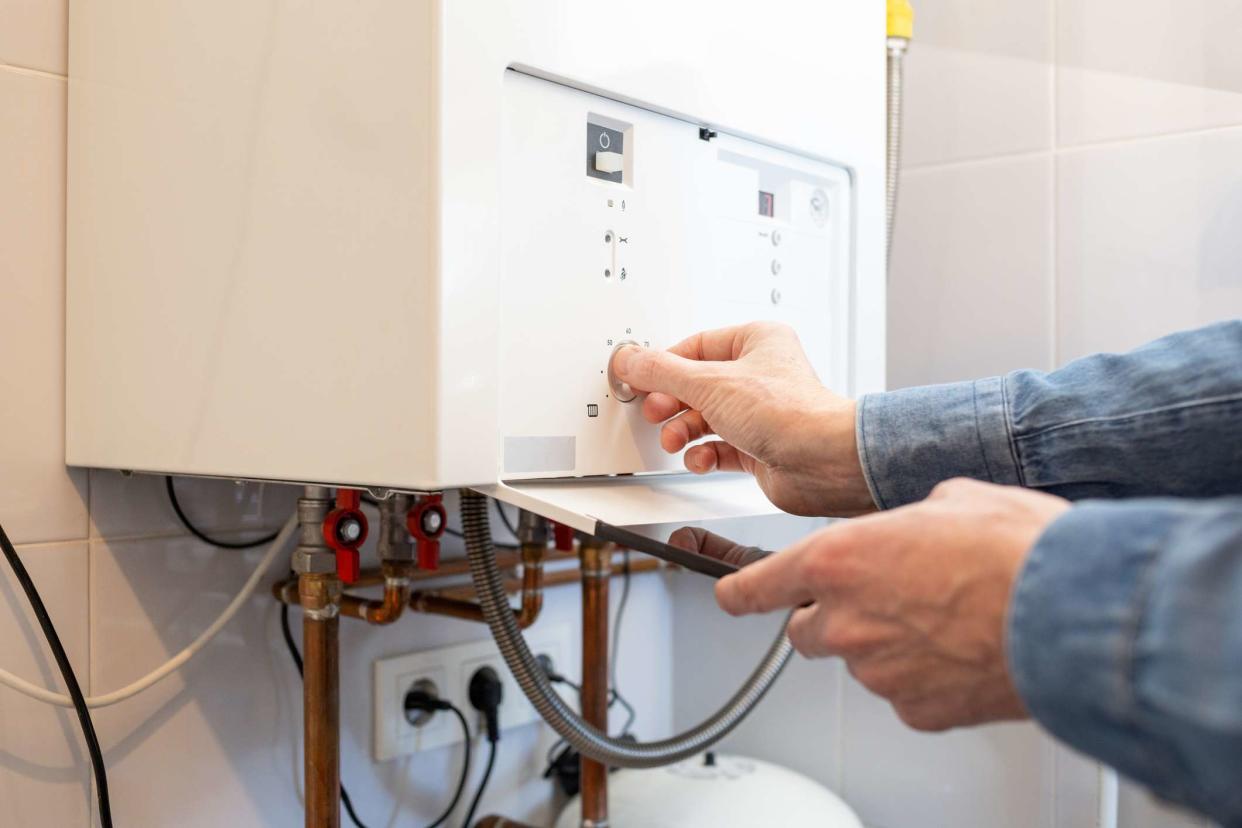How Long Does a Water Heater Last? And How to Know When to Replace It

brusinski / Getty Images
Access to hot water is a luxury that many people take for granted until the water heater starts to act up. Instead of waiting for there to be a problem, learn how long a water heater lasts, so you can plan and budget for future replacement.
How Long Does a Water Heater Last?
There are two main types of water heaters used in residential buildings, including the conventional tank-style water heater and newer tankless water heaters.
Tank-Style Water Heater
Tank-style water heaters typically last about eight to 12 years with regular maintenance and upkeep.
A tank-style or conventional water heater is the standard option in most homes. These units consist of a large tank where the incoming cold water is stored. Once the water enters the tank, it is heated by the element in the base of the tank. The water heater will continue to heat the water until it reaches the set temperature on the thermostat.
At that point, the heater will only turn on intermittently to keep the water warm. If hot water is used, then cold water will flow in to replace the hot water, prompting the water heater to begin the heating process again.
Tankless Water Heater
Typically, a tankless water heater will last about 20 years with proper maintenance and care.
Tankless water heaters are not as commonly used, but they can be a great choice for small- to medium-size homes. These water heaters don't take up as much space as a tank-style model, and they offer hot water on demand. The incoming cold water flows through the tankless water heater. While it is flowing through the unit, the water is rapidly heated to the desired temperature.
This type of water heater tends to be more energy efficient, though tankless water heaters may struggle to keep up with the demands of a large household.
Water Heater Lifespan Factors
There are several factors that can affect the lifespan of a water heater, including sediment buildup, hard water, and the location of the water heater. If the sediment in a tank-style water heater is not flushed about once every one to two years, then it can buildup in the base of the tank, leading to decreased water capacity and heating capabilities.
Hard water can cause premature damage to the interior of the water heater, so invest in a water softener to reduce the impact on the water heater and other water-using appliances. If the water heater is kept in a garage or crawlspace, then it may need to work harder to heat the incoming water during the colder months of the year. This can lead to the water heater failing before the end of its expected lifespan.
Signs You Need a New Water Heater
Understanding the average lifespan of a water heater helps to prepare for the eventual replacement of the unit, but it's also a good idea to look out for signs that the unit may be failing.
Banging or rumbling noises or a drop in water temperature can indicate that there is a significant buildup of calcium and sediment in the base of the unit. Flushing the tank may help, but eventually this issue will affect the operating efficiency.
Odd smelling hot water is a sign that the water heater may be contaminated by bacteria or that the metal inside the water heater is breaking down and entering the water. If cleaning the unit doesn't work, then it may be time for a new water heater.
Red or dirty yellow water typically indicates that there is rusting and corrosion within the system. If only the hot water shows this discoloration, then the issue likely originates inside the water heater, instead of being a problem with old galvanized piping.
Leaks are a serious problem. If you spot water leaking from the base of the unit, it may be cracked or corroded internally. Contact a plumber as soon as possible to replace the water heater.
Plan Ahead Before Replacing a Water Heater
Learning the expected lifespan for a water heater is important for planning the replacement of the unit. Don't wait too long to budget for this replacement, or the unit may fail before you have time to save for an updated appliance.
Start budgeting about two years before the predicted lifespan end. This will ensure that even if the unit fails prematurely, you can have the water heater replaced.
Make sure to look into energy-saving units to help reduce the utility bill costs for the home. If the current water heater does fail before the warranty is up, then you may be able to get the unit fixed or replaced for a reduced cost. Speak to the manufacturer to better determine how they can help.
Frequently Asked Questions
Can a water heater last longer than 20 years?
A water heater can last for over 20 years if it is properly installed and maintained. However, the efficiency of a tank-style water heater may begin to decline after about 10 years of age.
Should I replace my 15 year old water heater?
Typically, a tank-style water heater will last about eight to 12 years, while a tankless water heater can last up to 20 years. If you have a tank-style water heater that is 15 years old, you should replace the unit, but if it's a tankless model, then you may still have another five years to plan for a replacement.
Read Next: How Long Do Dishwashers Last? What You Need to Know
Read the original article on The Spruce.

